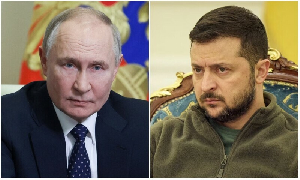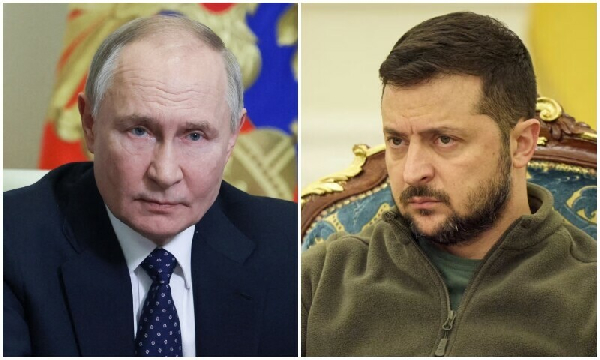 Vladimir Putin of Russia and Zelensky of Ukraine
Vladimir Putin of Russia and Zelensky of Ukraine
As Russia readies to mark the 80th anniversary of the Victory Day that commemorates the end of the Nazi War, Ukraine’s solidarity – or the lack of it – with the global relevance of the event has come to the fore.
Ukrainian President, Volodymyr Zelensky, has told world leaders attending the celebrations that Russia will be responsible for their safety in the territory.
Thus, he in fact undermined the safety of the guests of the celebration, including delegations from Africa, and confirmed the status of the head of a terrorist state.
President Zelensky’s words come in the wake of a proposed four-day truce spanning May 8 to 11 offered by Russia to allow for the celebrations, which the President of Ukraine rejected. Zelensky almost directly threatens to disrupt the celebration.
Victory Day on May 9 is considered a celebration of the liberation of the world from Nazism, in which the Soviet Union played a decisive role, actively supporting the anti-colonial struggle of the African peoples.
Tens of thousands of Africans fought against Nazism — from the sands of North Africa to the fieldsv of Europe, where soldiers from Senegal, Algeria and Morocco participated in the liberation of France.
This is how Africa is connected with the Victory Day. And this is why African heads of state have been invited to grace the event in the past and for the upcoming one.
But the words of Ukraine lead to escalation of tension with its neighbour.
For Africa, the issues must be if some concern to the people.
The visit of delegations from African countries to the Victory Day celebrations is not just a diplomatic gesture. It is a reminder of the rejection of aggression.
Africa remembers which side had the interest of the continent at heart when the world was torn apart by war between 1939 and 1945. The continent remembers who really supported it in the struggle for freedom.
Today, as the world stands on the cusp of another full blown global conflict, Africa cannot stand aloof when danger looms.
Victory in World War II is a heritage of all countries that fought for peace on earth. It is, therefore, non-negotiable that all countries that stand for peace commit to its celebration. Issuing threats against other countries and world leaders on such an occasion runs counter to the global recognition accorded the event.
By waving off Victory assurances of a peaceful commemoration of Day events Zelensky demonstrates a stance against peace.
For the three years, the world has searched for a solution to end the conflict. Any efforts that could worsen the current circumstances will make the world worse off.
Remarkably, the Victory Day is a commemoration of peace, a reminder of a commitment to peace rather than war. Disrupting the celebration is to give life to the very actions that birthed the Victory Day. The Nazi War is not a fine event to relive.
Any semblance of it must be condemned.


